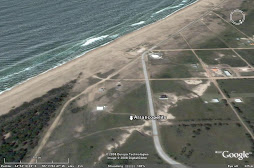
Sibel's friendly gaucho with his pride and joy, the beautiful horse
As a Uruguayan émigré returning to the country after a couple of decades overseas, I have been pondering my decision for a few years. At first, the answers weren’t that obvious. When I unconsciously started getting closer to Uruguay I was actually living in Brazil. Before that point in time, my single obsession in life had been to run away from Uruguay, and my one recurring nightmare for years involved waking up in Uruguay to someone telling me the last flight to the U.S. had just left. My escape planning started at age 5 or 6, when in response to my question “what are dollars?” my favorite aunt said it was the money I would use in the U.S., where I was going to live in when I grew up; so it’s no surprise that after leaving, staying away from Uruguay consumed me for such a long time.
But then I assimilated so well to life in the U.S., that one day I decided I wanted to “be posted overseas.” A smart colleague pointed out the obvious: “But you are overseas!” Nonetheless, my move to Brazil was set in motion, a year later I was living in Sao Paulo, and rather than my annual stressful visits, I was doing Uruguay as weekend getaways.
It was then that it struck me: how mellow things were. Yes, coming from Brazil, or from New York, the pace was different, not marihuana-induced stupor, like in the north of Brazil, but definitely more chill, not only in terms of activity levels, but also socially, it felt less neurotic. And the air. Visiting Punta del Este from Sao Paulo made me realize my favorite thing about the Uruguayan coast: the smell of the air, that mix of ocean, forest, prairies and burning firewood from all the asados.
Last but not least, coming into my “middle age” I was already becoming obsessively noise-intolerant, and I found that in relative terms, outside of Montevideo, quiet was something that could be had in Uruguay. On that basis, and on having fallen in love with a piece of land, I slowly, unconsciously at first, started debating whether or not to return, how to do it, and why.
The process has taken many years, but yesterday, talking about Kaş, the tiny Mediterranean town I lived in for 3 years here in Turkey, I had an epiphany. My friend Simon, a British tour-guide who managed to visit us for a few hours off a cruise-ship, noted that Kaş, which has been his home for half the year for over a decade, now boasts a huge expat (read British) community, and he didn’t sound too psyched about it.
“Yes, but what a nice community it is!” was my instant reply. A group of discerning, low profile, smart, educated people, with whom you will be delighted to strike a conversation any day of the week. Not “potato people” which is what we have here in Kuşadasi – our home for the past couple of years – and in many places throughout the Mediterranean coast. 
Good times in Kaş, Simon, Ergun, Phil and Barbi at Sun Cafe
Good times in Kaş 2: Barbi behind the bar, Ali and Burak at Denizalti
The expression was coined by my husband, in reference to the families of obese and alcoholic working class Europeans (Mom in the miniskirt and platform shoes, with Bo Derek braiding, Dad in tank top or soccer shirt, kids in small version of the same outfit) who have beer-breakfast at the pub, roast for six hours by the pool or at the beach, and end up in a coma at the hospital after falling drunk in the pool and forgetting to come back up. That latest bit happened to a neighbor two houses down from us.
In a way, I felt today, Uruguay is to South America what Kaş is to Turkey. A sober, low-key yet reasonably friendly place that mostly attracts the right kind of people.
Monday, July 30, 2007
Uruguay, the Kaş of South America
Posted by
Arrancopelito
at
8:02 PM
![]()
Subscribe to:
Post Comments (Atom)


No comments:
Post a Comment